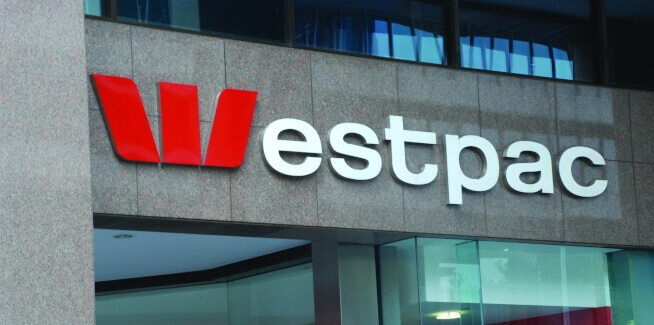Westpac has announced items it expects will affect its first half 2020 results, including penalties stemming from breaches of the anti-money laundering and counter terrorism financing (AML/CTF) laws flagged by AUSTRAC last year.
In an announcement to the ASX, Westpac said that while it is still undertaking detailed analysis to finalise its impairment provisions for first half 2020 (1H20), its impairment charge is expected to include a significant collective provision increase that will lift the group’s total provision balance as it expects credit losses from the coronavirus outbreak.
The bank said it expected new and increased provisions (excluding impairment provisions) and asset write-downs totalling around $1.43 billion after tax, which it said would reduce 1H20 cash earnings. Statutory net profit after tax would also be reduced by these items, the bank added.
The items that will affect its first half results, along with their cash earnings impact, include:
- Provisions and costs associated with the AUSTRAC proceedings and response plan of $1.03 billion after tax. This includes a non-tax deductible $900 million for a potential penalty relating to the AUSTRAC proceedings;
- Approximately $130 million cash earnings impact of costs linked to the AUSTRAC response plan. This includes improving its financial crime program, supporting industry initiatives to enhance financial crime monitoring and provide additional support and resources to organisations working to eradicate child exploitation. The total pre-tax cost is $160 million and includes the previously disclosed response plan estimates ($80 million) along with higher legal expenses and additional costs linked to enhancing the group’s financial crime program.
- Approximately $70 million in other asset write-downs, with the group revaluing or reassessing the value of certain assets, including some capitalised software costs and some physical assets. The pre-tax cost is around $100 million.
AUSTRAC proceedings
Following the proceedings launched by AUSTRAC in November 2019, Westpac has been in discussions with AUSTRAC to agree on a Statement of Agreed Facts and Admissions, alongside a proposed penalty that could be put to the court on a joint basis with AUSTRAC.
At the case management hearing on 30 March, the court ordered that the parties file a Statement of Agreed Facts with the court by 8 May, and a defence in relation to the remaining matters by 15 May.
Based on the available information, Westpac said it expects to make a provision of $900 million for its potential liability in relation to the AUSTRAC claim.
“The provision will be taken in circumstances where there remains considerable uncertainty on the approach the court would take to assessing the appropriate penalty and where there remains a prospect of agreeing [to] a penalty which could be recommended to the court on a joint basis (which the court would have regard to but not be obliged to accept,” the bank said in its statement.
“The court’s decision on an appropriate penalty will involve balancing many different competing and complex factors and the exercise of discretion.”
Westpac flagged that the actual penalty paid following the statement or a joint submission, or a hearing, may be higher or lower than the provisions it has made.
Commenting on the AUSTRAC proceedings, Westpac CEO Peter King said: “In addition to closing relevant products and recruiting an additional 200 people in financial crime and compliance, I am putting in place a clearer accountability regime that will speed up decision making, improve implementation and more clearly define responsibility and its associated risk management.”
Westpac has been served with at least three class action suits following revelations of AUSTRAC allegations against the bank regarding 23 million breaches of AML/CTF laws.
The first class action filed by Phi Finney McDonald stated that between the close of trade on 19 November 2019 and the close of trade on 22 November 2019, Westpac’s share price on the ASX fell by approximately 7 per cent.
The second suit was filed in February 2020 by US-based litigator Rosen Law Firm, which alleged that Westpac made false and/or misleading statements and/or failed to disclose vital information.
The third class action suit was filed by Johnson Winter & Slattery in the Federal Court of Australia against Westpac and “one of its prior executives”, on behalf of certain shareholders, over “alleged systematic non-compliance” with AML/CTF laws.
COVID-19 fallout
Westpac listed approximately $70 million in other asset write-downs as a result of significant impact from the economic fallout from the coronavirus outbreak, but this did not include the cost of loan impairments and arrears from customers with small business and home loan mortgages as a result of the pandemic.
The bank said it is undertaking a detailed analysis to finalise its impairment provisions for 1H20.
Westpac and several other lenders announced they would allow small-business customers (and some mortgage customers) to defer their loan repayments for six months in response to the economic fallout from the coronavirus outbreak.
Following consultation with regulators, the Australian Banking Association (ABA) announced a relief package for small-business customers, which was recently expanded.
Following the $2.8 billion of capital raised in the half (around 63 bps to the CET1 capital ratio) and payment of the final 2019 dividend, Westpac’s CET1 capital ratio was 10.8 per cent at 31 December 2019.
The impact of the items disclosed today on Westpac’s CET1 capital ratio is estimated to be around 30 bps, with some items having no impact on capital as they are already capital deductions.
[Related: Westpac to refund disgruntled investors amid AUSTRAC scandal]
 ;
;
